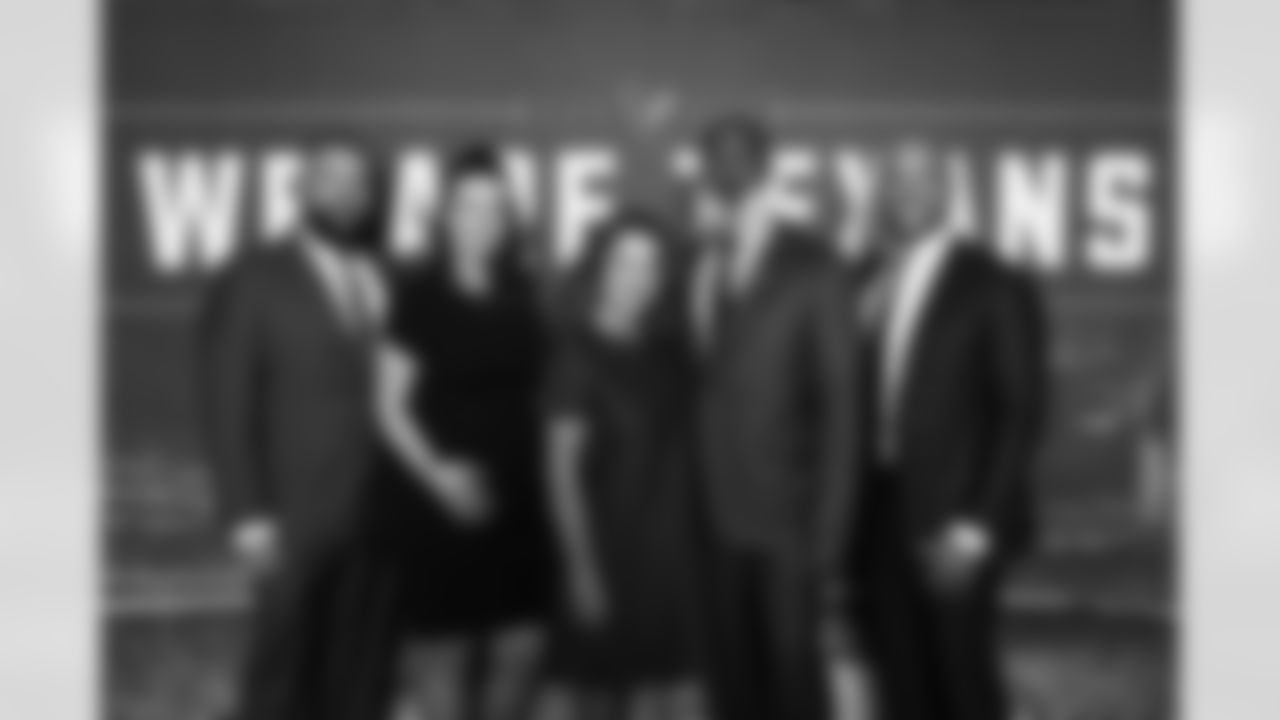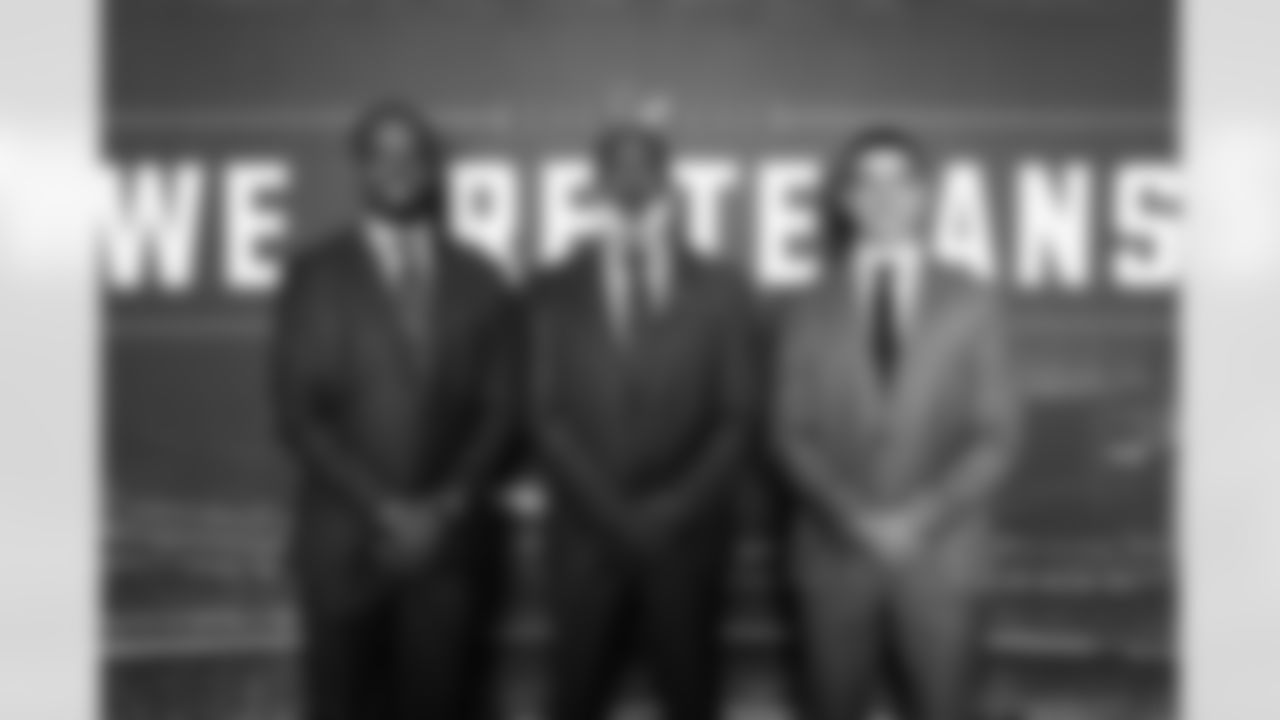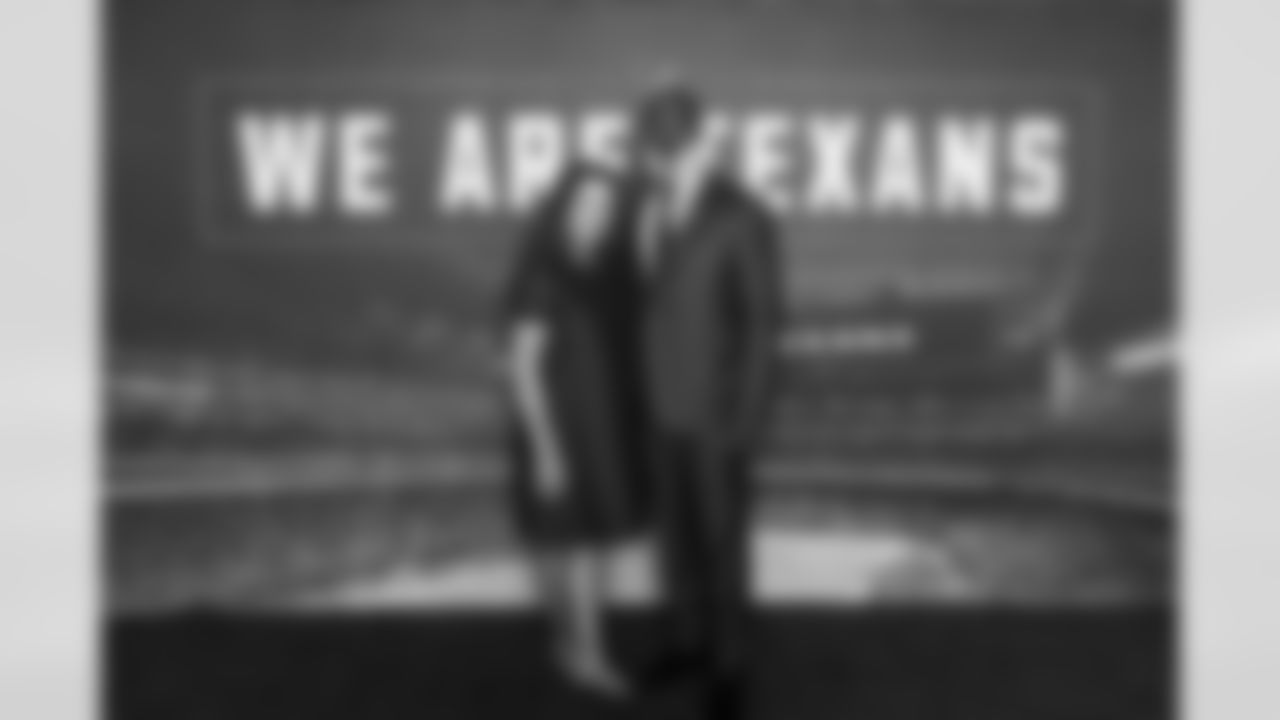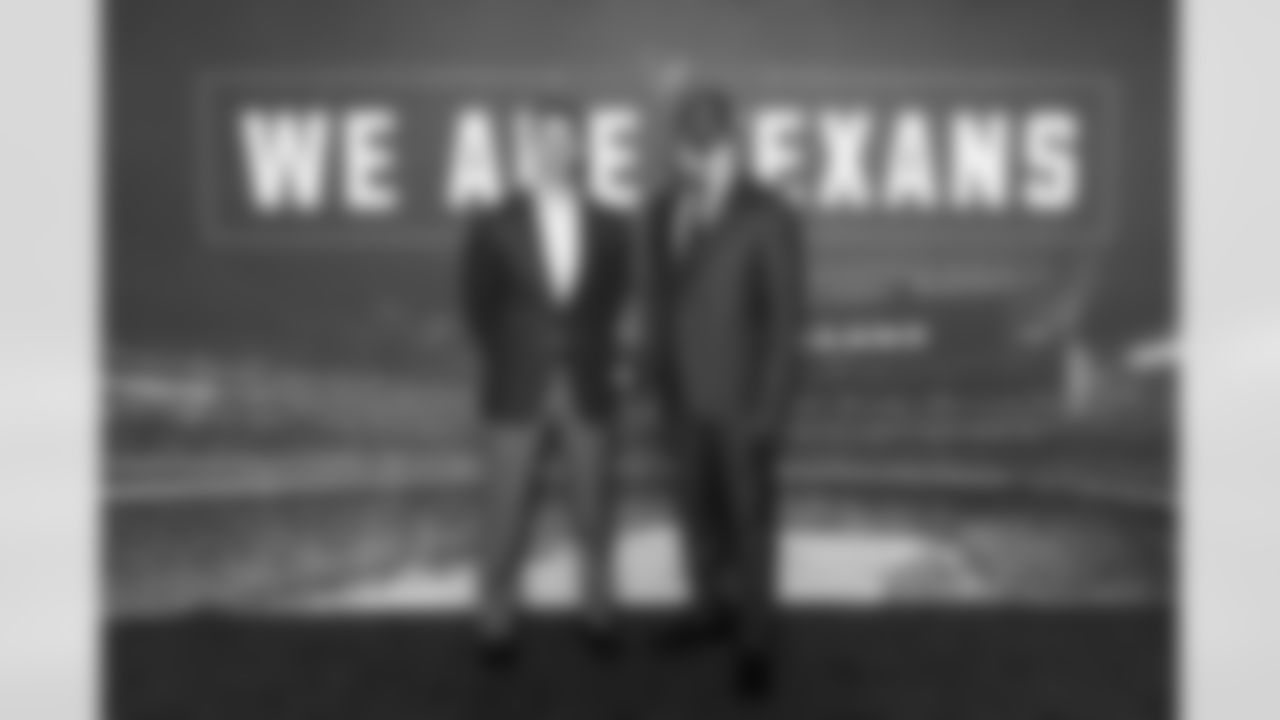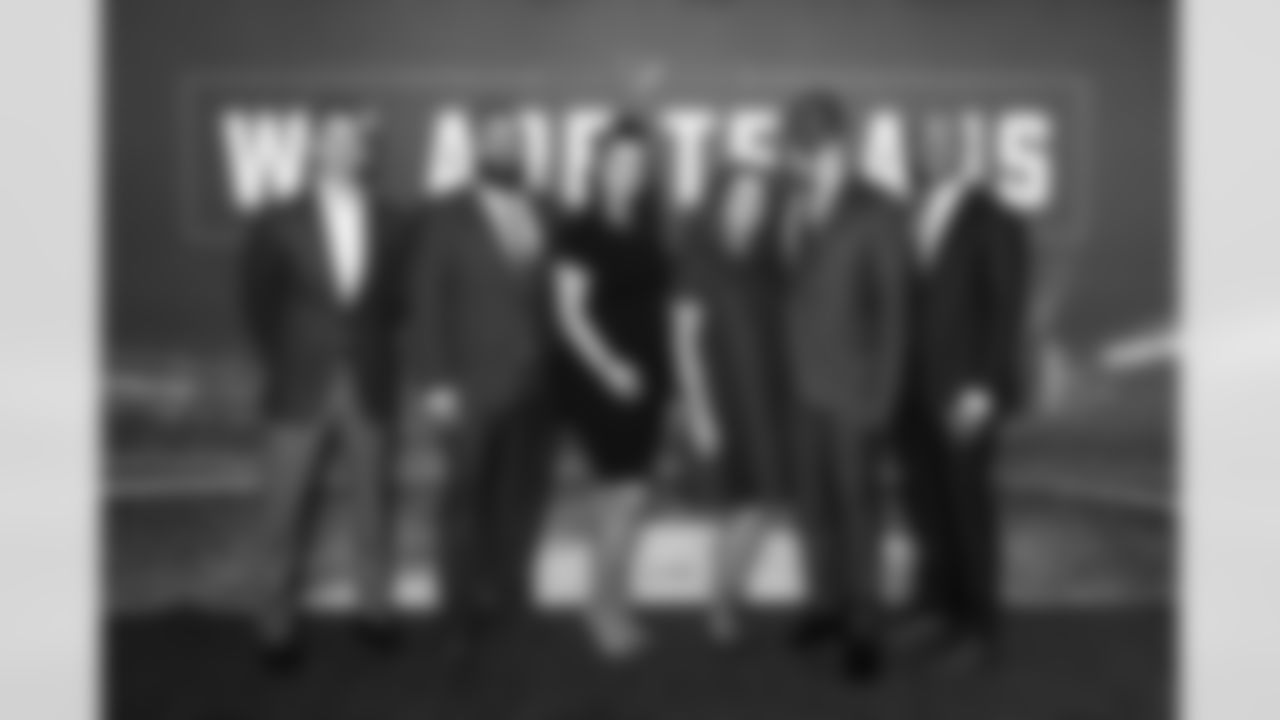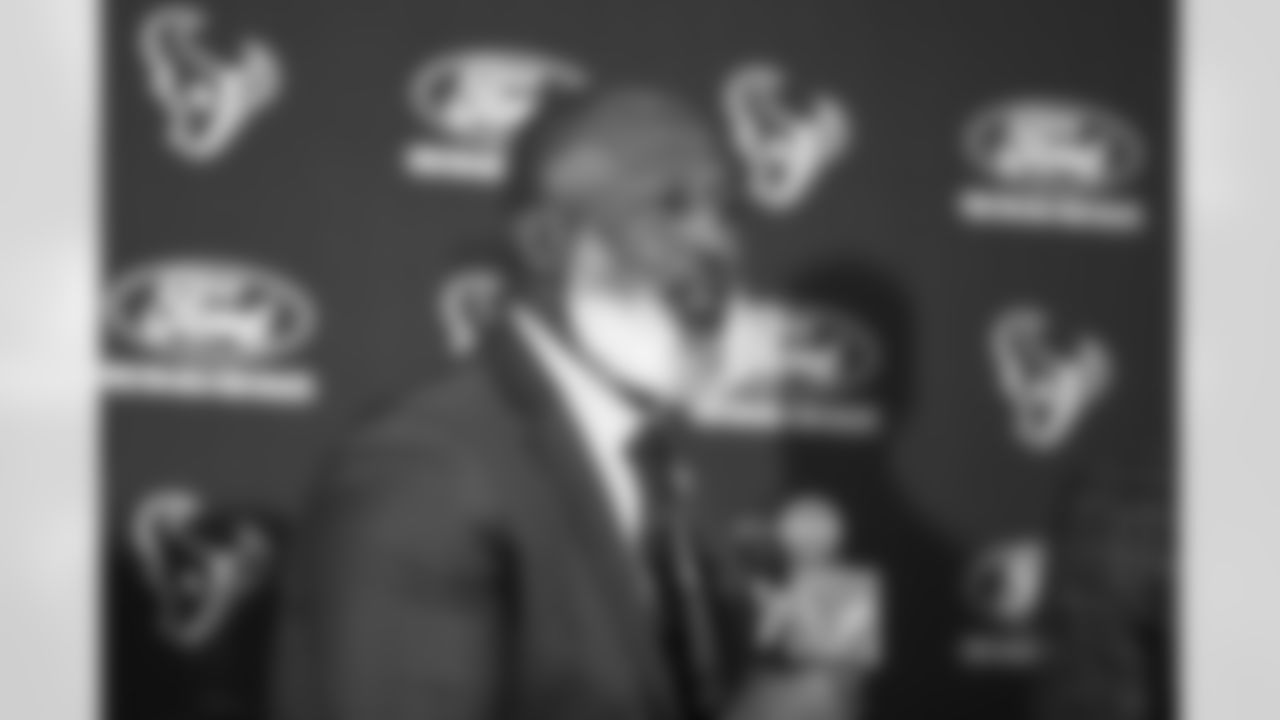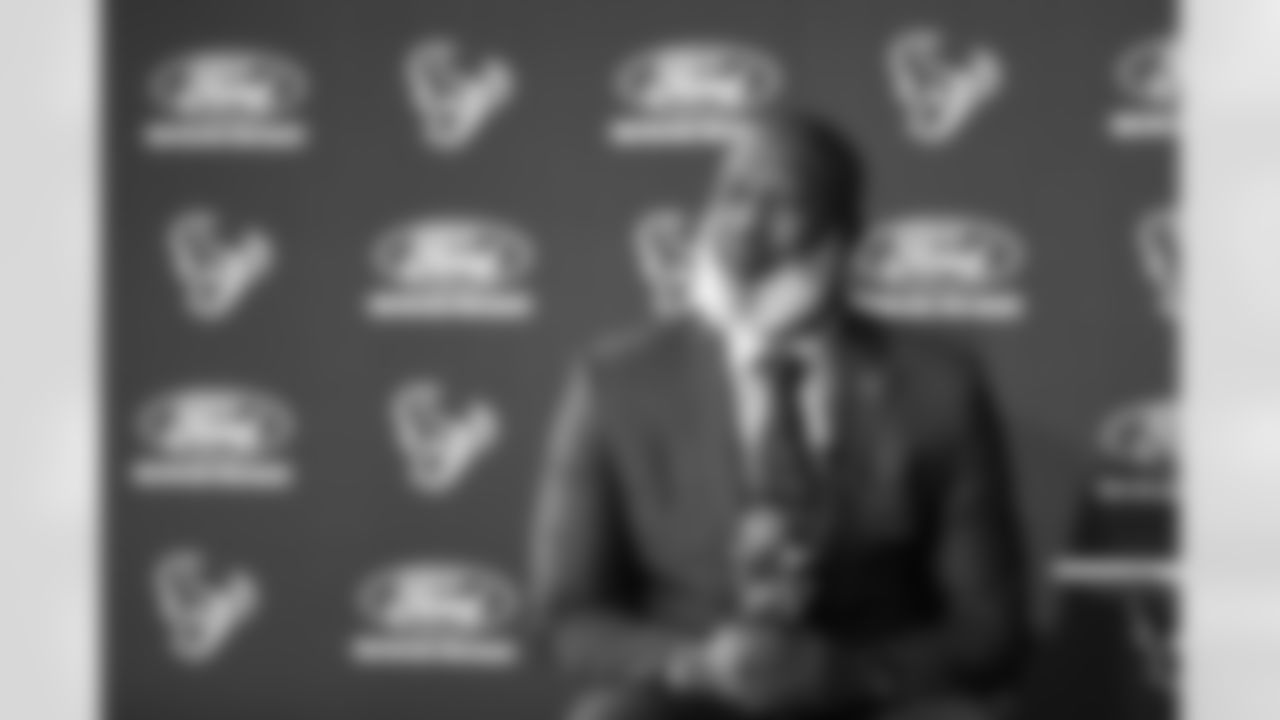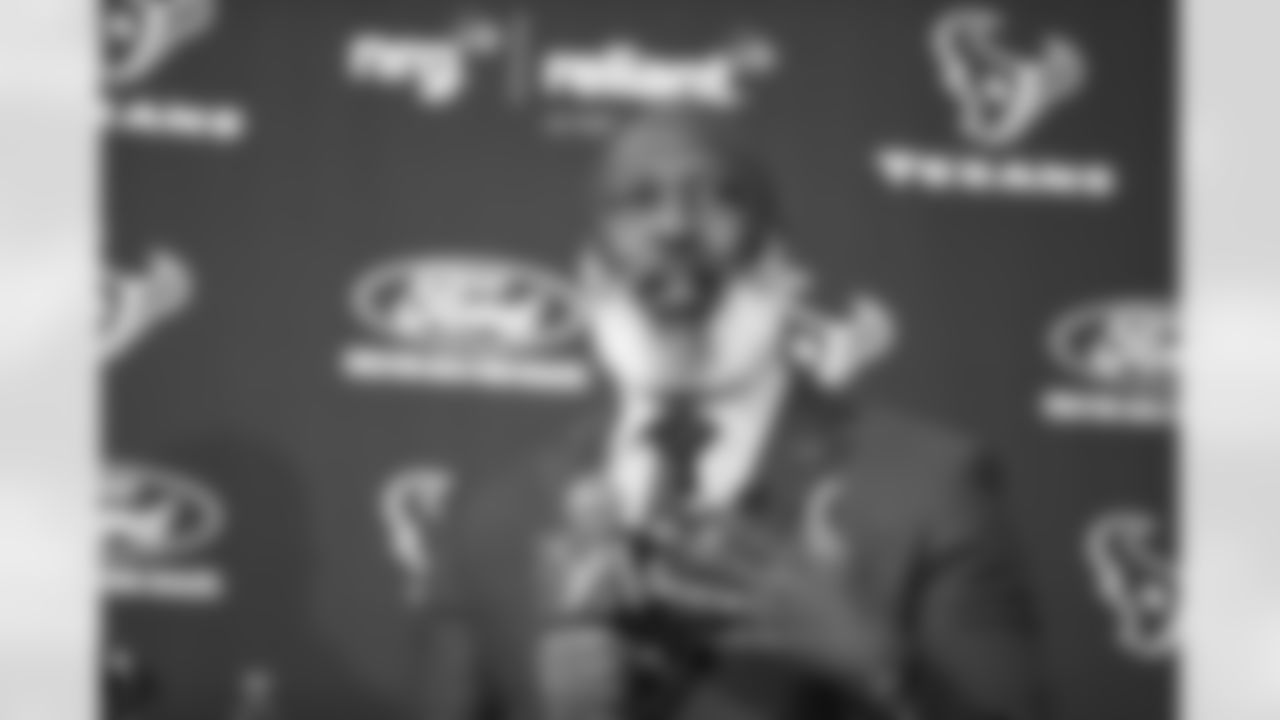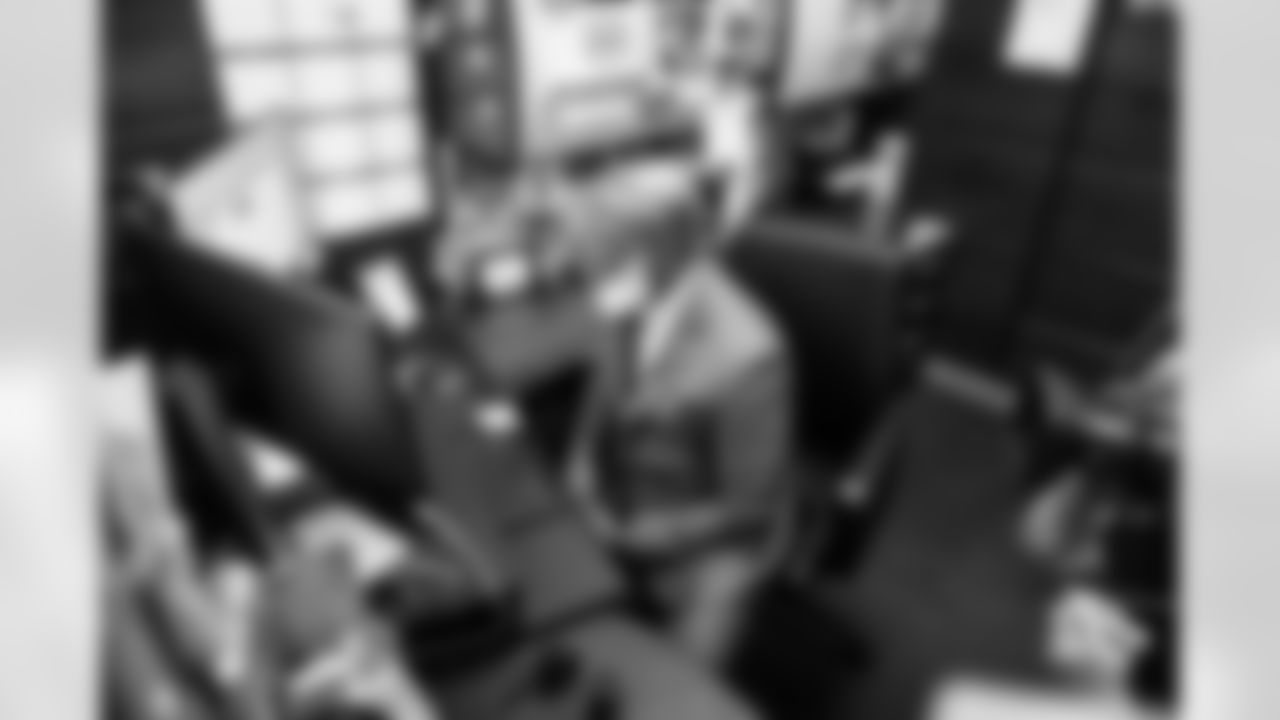Opening Statements
(Chair & Chief Executive Officer Cal McNair) "Welcome, everyone. It's an exciting day. I'm really glad we're able to do this and do this in person. Our goal here is to build a program that can compete for championships and sustain long-term success. My family and I are extremely competitive, and the last couple of seasons have been disappointing, hard for all of us. But I believe in Nick Caserio and the vision he has for our football team. And I see the pieces coming together. I've never seen a more thorough, inclusive, and in-depth process than what Nick went through with our coaching search. Our entire organization is an entirely better place than it was last year in large part because of Nick. But all of that work and progress behind the scenes needs to start showing up, and we understand that. I expect to win at everything we do, and there is pressure to perform in our organization. I've had an extreme amount of respect for Lovie Smith for years, and that only grew last season and throughout this whole process. So, I'll turn it over to Nick and say a few words and introduce Lovie as our head coach."
(General Manager Nick Caserio) "Good morning and welcome. Try to bring a little levity in the air. I know everyone's disappointed I don't have a vest on. So, I'll save those for the season. And no Silicon Valley references either, Landry [Locker]. So, you don't have to worry about that. First of all, want to thank everyone for being here this morning. First off, I want to thank the Smith family, Lovie's wife, MaryAnne, Miles, Matt, Cara, baby soon to be on the way. So, this day is really about the Smith family and it's about the McNair family. Just a word about Cal and Hannah. I just appreciate their support throughout this entire process. They put a lot of faith and trust in what I'm trying to do, what we're trying to do as an organization. They stood behind me every step of the way and I'm blessed to have their trust and thank them for backing me throughout this process. I'd say the process in and of itself is a long and thorough process. My responsibility was to do as much work as possible, and we started second week in January and we arrived at the end point here today. There was a lot of conversation and dialogue with a lot of people throughout the league: players, coaches, executives, former head coaches, different people. My job was to take a lot of information in that process and try to put ourselves in a position to make a decision I feel is ultimately best or the Houston Texans organization. And I believed we arrived at that point. Coach Smith is one of the most respected figures in the league. He's well respected throughout the league. He's well respected in the halls of NRG. I think a lot of us were able to see that this year. As I worked through this and got to the end point, realized the best decision and the best opportunity for this organization to move forward was with the choice of Lovie Smith as the next head coach. I'm excited, we're all excited, we have a lot of work in front of us. I think Lovie and I both feel the same way. We both know what the road ahead looks like. We have a lot of work to do. We're committed to doing that work. So, to Big Sandy's own, to the best gray beard in the building, I'm going to introduce our next head coach, Lovie Smith."
(Head Coach Lovie Smith) "Thank you, Nick. There's a lot of people. Just think I'm a high school product of our great state of Texas, and a dream, as you start playing football, you want to have a chance to play as long as you can, and to me, I always wanted to be a coach. So, I say that most guys playing high school football here would like to someday lead their home state team. I can't thank Cal, Hannah, Mrs. McNair, I can't thank them enough for having the faith in me to lead our great program. Also can't thank Nick enough. I had a chance this past year to work with Nick in a lot of different ways. Sometimes you have an interview for a couple of hours or whatever. I had a chance to work with Nick for an entire year and for him to see me on what I believe, how I believe football should be played, how I think you should coach our young men. So, there's just so much I was able to get from that. I wanted to be a coach all my life, and a lot of that is based on what I had in a coach growing up. Think about this also. My seventh grade basketball coach still coaches football here, high school football coach here in the city of Houston. My first college coaches lives here in this great town. So, really pumped up about it. The love of my life I met on a blind date 42 years ago, will celebrate 42 years today, my wife, MaryAnne, and then also the rest of my family here. I have a chance to work with an outstanding linebacker coach on our staff in Miles Smith and his wife Cara, and another one of my sons, Matthew, is here. The special people that I have here with me today are guys that will be leading, will have a prominent role as we go forward playing winning football. I've known Pep Hamilton for a long time here, and his wife Nicole. And I tried to hire Pep a couple of different times and it didn't work out. And it's kind of perfect storm for him to be able to lead our offense. He'll be leading our offense this year. Someone I did know, but this past year allowed me a chance to get to know was Frank Ross. Frank is an outstanding special teams coordinator. He and his wife, Christina, and their lovely daughter are here. I'm so excited them about wanting to join our staff. A lot of people in this building have helped me. I got a chance to know during this year. So thankful for them. But to sit in this role, in this position, it's about winning football games and doing it a certain way. My philosophy, I'm a little bit old school. Again, I'm from a little small town of Big Sandy that's about winning football. We had a simple formula: play good offense. And our good offense helped, what we'll be leading, is you need to be able to run the football. There is a time we need to pass the football, but doing it in a certain way. Tough, hard-nose, disciplined ball. That's what you'll see from us. On the defensive side of the football to be able to, again, score on offense. It's not, as we look at it, it's not a turnover. It's a takeaway of getting takeaways and just, again, playing a certain brand of ball. Then on special teams, you cannot win football games without that third element: special teams. There's going to be hopefully one of the all-time greats going into the Hall of Fame based on what he did, guy I had a chance to coach, was special teams. But it's important. But the fourth phase would be the fans. Cannot play winning football without you. I have seen a day when it's tough playing inside NRG Stadium, and it's our responsibility to get the fans back and get them excited about the product we're going to put on the football field. I guarantee you we can do that. So, it's a great day. We're excited. We all are. As we go forward, look forward to work hand-in-hand, side-by-side with Nick to get the Texans back to where they need to be. Thank you."
How did it feel to not be a part of the process, get the last interview, and then finally get your third head coaching job?
(Smith) "Thank you. Well, the question, John, I've known John a long period of time. Well, how it feels, and as I said, the goal of a lot of us would be ultimately to lead our professional football team. As you go through the process, I've been a head football coach for a lot of years and gone through a lot of the process. In the end, you end up with the guy you ultimately feel like is right to lead the program to the next phase. That's, for me, I had a great job last year being the defensive coordinator here last year. I got to see the potential for what we could do here. And the opportunity presented itself to me, late in the game, I was just excited for it because I know what we can be around here."
What were your emotions when General Manager Nick Caserio told you were his guy? And part two, where does this moment stack up among all the great moments you've had in your career?
(Smith) "You can imagine the excitement I did have when Nick did tell me. There's 32 of these jobs in the country. So, to have an opportunity to lead one, and there's an extensive process Nick went through to get the best person that he felt could lead our program. So, of course, you can imagine how I felt. What was the other part of your question? [where does it rank] I thought that's what you asked. My wife, MaryAnne, is here. It's pretty special moment, that blind date we went on — pretty special moment. And there's been a lot of others. We're expecting grandchild No. 9 and 10. A lot of special things have happened to us and our family. But this moment is pretty special. It's not often you get a chance to lead three professional football teams. I don't know if there's a guy that looks like me that's had the opportunity to do that. So, that's pretty special, but just what I know about the organization and the potential. You know, as you look at players, you're always talking about the potential, what you see in an athlete. Just to lead a program like this, I know the potential and what we can do and we can start the process this year."
I'd like to know your take on what you just said. Nobody who looks like you has coached three different teams in the NFL. What's your take given your experience on the Brian Flores lawsuit against the league?
(Smith) "Well, I don't know enough about the lawsuit. This is what I can speak on. I realize the amount of Black head coaches there are in the National Football League. There's Mike Tomlin and then there's me. I don't know of many more. So, there's a problem. It's obvious for us. But after there is a problem, what are you going to do about it? There's a lot of different talk on how and what you should do. I think all comes down to action a little bit, and I know one person that wanted to do something about it, or the color of your skin or who you want leading your program, but I know Cal and Hannah, of course, they said maybe there's a problem — not maybe there's a problem — here's what we're going to do for it. I'm here. So, and what we're doing, and it's not just about me being here right now, on how head coaches are selected a little bit. A lot of it, a lot of offensive coaches are leading their programs right now. Two Super Bowl participants have offensive guys that have made their living with offensive football. I understand that. I know as we go forward a little bit, I see Pep Hamilton right here and I see his color, and he's going to be calling plays for us. Maybe it's about getting guys in position to see exactly who they are and what they can do. I understand the problem, and I know the Houston Texans are doing something about it to make it better."
I was going to ask you specifically that happened last week, the lawsuit was filed, how did that influence, if at all, where you are now?
(Caserio) "I would say didn't affect us at all. I would say, speaking specific to Brian, I've known Brian a long time, personally and professionally. I have a lot of respect for Brian as a coach and as a person. As a part of this process, he was a competitive coach in this league for a number of years. Part of my responsibility was to spend time with as many quality candidates as possible. As it pertains to the lawsuit, I would say at the beginning when we started our process, call it Jan. 14 to now, there were multiple conversations throughout the course of, I would say, the last few weeks with a number of different candidates, and that was pretty fluid. This process in and of itself is very fluid —I'll try to talk over with the microphone. This process is pretty fluid, right, and you have to take information in. I would say there were conversations with Brian after that took place that didn't affect the process at all. A lot of it was me taking information, processing a lot of information, talking to various people and different parties, different candidates, and ultimately arriving at an end point that I felt made the most sense for our organization, and that's what we did. That's what happens when you have an event upstairs."
Were the Texans planning to hire Josh McCown? And the second part of that is will Josh McCown be on Head Coach Lovie Smith's staff?
(Caserio) "There were never plans to hire anybody until we kind of arrived at an end point. And I'd say as it pertains to staffing, Lovie and I will have discussions on that. Lovie will have a lot of input. There will be a lot of other coaches that have input. The next step for us after today is to kind of continue to build out the staff, and I'd say we're making progress on that. What that final constitution looks like at the end, you know, I'm sure there will be some moving parts here as we go."
You were talking about Offensive Coordinator Pep Hamilton and how you helped put him in position. Is that your job, helping people that kind of look like you? Was there anyone who helped you do that to put you in this position?
(Smith) ""Yes. First talking about me, I had a chance to work on my first staff in the National Football League was on Tony Dungy's staff, a Black man that gave me an opportunity. From talking to him back then, it was about — and it's just not the coordinators. I think we have a responsibility, and for me being a Black man, to give as many guys — back then, it was about an opportunity. I think it's important to give Black coaches as possible an opportunity to work up through the ranks. As you look at my last staff in Tampa, my last staff at Illinois, I've heard the statement there's not enough qualified guys. That's a misnomer a little bit. But to answer your question, I think the ones of us in this role, and not just a Black head coach, but all coaches in general — you look at our league. Of course, the majority of our league is with Black athletes. You can find qualified Black candidates, candidates that worked themselves up. Once you look at our staff once it's all done, completed, you'll see there's not just talk going into that. We have a lot of young, Black coaches that are going to do great things, of course, Pep Hamilton being one of them."
You said that there wasn't a plan to hire anyone until you reached an end point. After the lawsuit went through, what were some of the things that helped you make that decision? Because there's probably obviously things you wanted to know and wanted to know about that in reaching your ultimate decision.
(Caserio) ""Yeah, nothing really changed. Again, I'd say these processes, there's no direct path in getting to your ultimate end point. I'd say there's a lot of information, again, that my responsibility is to try to process that. And I think to keep that communication open, I think the McNairs have been very supportive. I'd say we had a lot of dialogue through the process over the course of the two to three-week period. So, you just try to stay on track, try to stay on course, and ultimately I'm kind of a very pragmatic, kind of internally driven or internally process oriented individual, and ultimately it was kind of my responsibility to work through everything and to make the decision I felt was best. I'd say Lovie was a big part of those discussions at different points throughout the course of the process. He had an opportunity to speak on our program. Once there was an opening that was available, Lovie was able to give his viewpoint of the program, what are some of the things we did well, what are some of the things we'll be able to improve upon. So, to have that type of input as you're going here in your building, it certainly resonates and carries some weight. So, again, ultimately was trying to be very thoughtful. That was my mission and my goal and that's what the McNairs asked me to do. And that's what I did to the best of my ability and ultimately make the decision that I felt was best for our entire organization."
To follow up on that, Head Coach Lovie Smith being a part of the staff, how that relationship helps you. Going into it, what were you looking for in a candidate and having gone through other candidates outside the building, what is it that ultimately led you to someone who was ultimately in your building?
(Caserio) "Ultimately it's about the right candidate for you and your building. I would say we talk about this at different points. Head coaching, coaching in general is about leadership and it's about teaching. Those are the two core elements. Whether you have a philosophical belief on one side of the ball, you're an offensive coach, you're a defensive coach and how that translates onto your team or not. So, I would say those core elements, and Lovie kind of articulated some of the things that he believes in offensively and defensively. I would say one of the things that was interesting just overall in my perspective, Lovie and I really didn't know each other last year going into the season. And I would say systematically, defensively it was certainly an adjustment or something that was different relative to what I used to being around in New England from a front structure, from a number of different things. And it's interesting. Lovie and I laugh about it now, but, like, we had a lot of good discussions, a lot of good dialogue and conversations, and sometimes friendly disagreements about A, maybe how we were playing certain thing or who was doing it, and to his credit he was pretty open-minded and would listen. And I think, not just to speak for Lovie, but the year two of a system, you can make a few more tweaks and modifications and adjustments. So, I think as we build on what we did in year one and kind of put a foundation in place, kind of look at what some of those things are going to look like in a second year, I think those are some of the things that you kind of go from year to year that are important to take into consideration."
(Smith) "And also as you — I've had a chance to do this a while. To think I want an offense to look this way and then say, 'Well, you can do it this way.' That's the advantage when you had a chance to lead three programs on exactly what you want to do, what you want the offense to look like, wanted it to look like. And, of course, defensively I have some beliefs that's been instilled in me a long time what it takes to play winning football and how the special teams, offense, defense goes together. You're right. With Nick and I, Nick is a football guy. So, to see exactly, when you don't know each other and then you have to go over and explain why we do everything, it's always a good. It's why I'm so excited about us as we go forward."
My concern to you is with everything that's happened the last couple of years around the Texans both on and off the field, the production hasn't been great. I'm curious. What sold you on coming to the Texans? I know you have to sell yourself, but what was sold to you to want to take over here?
(Smith) "From being in the state, I mean, there's history. You got to look to history to tell you what it can be. It's always about that. As you look at players, it's not just the finished product that you look for. It's about the potential. And being here this past year, I saw the potential of kind of starting from the bottom floor and then start building up, and then as a coach see and just know. Again, experience tells you what it looked like here and where you can go, and I've had a chance to be in that situation. Who wouldn't want to play here in this stadium? A football city supporting you with great players — hopefully, one of our all-time greats back in the back, Andre [Johnson], have an opportunity to go into the Hall of Fame. But our history, what we do, what we've done here. Is that correct? I was kind of looking. Our history that we have in this program, and, again, going back to the Texas roots to know all about that. And to look where it's not long ago we weren't in the conversation about a team having an opportunity in the playoffs to get to the Super Bowl. It's there. And I know working together with Nick and of course the commitment we have from the McNair family, we can get that back there."
I know Offensive Coordinator Pep Hamilton is in the building as well, but I'm just curious, the changes to the offense, what they will consist of, what they will look like considering that's one of the areas where you needed the most improvement. Are you going to run a different scheme? What's that going to look like? And I have a follow up.
(Smith) "We have time to get into details a little bit, a little bit later. But you got a chance to see some of our players. I mean, it always starts with a quarterback, right? I had chance, Davis Mills, I had a chance to see him from a lot of different angles this past year. Early on he wasn't playing and he was going against the one defense every week. So, I got a chance to see him. Then, of course, got a chance to see him as he moved into our starting role. But it always started with the quarterback. And I know it's a little broad right now, but being able to run the football, and Pep has a lot of experience in a lot of different ways. It's not just one thing you're going to do. But what's it going to look like? We're going to have an offense that's going to score points, put our guys in position. There were times as you look over the course of the past year, we were really doing it the right way, you got a chance to see what we could possibly be."
And then the second question, kind of going back to — I know you guys don't want to comment on litigation, but some of the substantive points Brian Flores' lawsuit was trying to make was not just the hiring but the process. He points out a lot of Black coaches are put in less than advantageous situations and that sort of perpetuates this cycle of not being able to diversify the candidacy pool. Did you guys understand that? Is there anything to be said for, I guess, the overall situation for when you hire a Black coach. Last year, you hired one with a team that wasn't going to be very good. This year, you still have some challenges. Is that something that you have to consider, the substantive issue of that, on top of the hiring itself?
(Caserio) "I'll answer that. I think just specific — look, the numbers are what the numbers are league-wide. Nobody can refute those. Nobody can argue those. There's a couple of different buckets. That's an issue I think the league has to address, and I think they're committed to address. I think collectively, all of us, whatever our roles are. Like, we have to be willing and committed to be a part of that change as well whatever that looks like. Whenever you run a football team, you want to try to run a football team that has good people, has good players and good coaches, whatever that construct looks like. Our responsibility is to try to stay true to that and try to find people that fit those roles. And I think what Brian articulates, the numbers are what the numbers are. That's the reality of it. It's about finding solutions. I certainly don't have all the answers. I can't even come up, begin to fathom what that solution is. But to be a part of that solution, that's what we can make a commitment to doing, and really the most important thing for us is what's right for the Houston Texans, let's focus on our football, and let's do the things that we feel make the most sense for us."
You had to have some sense of comfort having Lovie Smith and all the experience in the same building. What was it that finally got you there? And then for you, Lovie, are you going to continue running the defense?
(Smith) "That's an easy one. You know, this past year I had so much fun. I've never — of course, I've been a head coach a while. A lot of those years I was heavily involved with the defense. I'm at the purity of the sport I love coaching. It's getting my hands on. So, to get around to answer your question, I loved calling plays last year. I will calling the defenses this year. Just look around right now. Most of the offensive head coaches that are offensive guys, they call the plays. For some reason, a lot of the defensive guys don't. I think I can help our program the most right now with me in that same role. So, I will be doing that."
(Caserio) "To answer your question, the search kind of embodies that to some degree. What I mean by that is I asked to be very thoughtful and very process oriented and very consistent. And I think when you kind look at Lovie on a day-to-day basis, that kind of defines who is as a human being. And you're able to see that; doesn't get too high, doesn't get too low, has certain things and convictions that he believes in. And he's well respected throughout the course of the building, not just in our building, but outside the building as well. I'd say I have a respect and appreciation for Lovie for who he is and what he's done over the course of his career, and I'd say I learned some things from him as well. I kind of had to open my mind on my part and realize, you know what, there's maybe a different way to do some things. Again, part of it is kind of having constructive dialogue. I think there were times we had that. Frank (Ross) was in some of those meetings where we had dialogue before the game about the role in the kicking game and a starter is playing on special teams and their role. Lovie has his beliefs on that and he's not afraid to share them, but in a very respectful way. Again, I think if we can respect each other as part of the process, whether it's about a player or it's about the scheme or whether it's who we're using where, again, when you watch us play this past year we had a lot of spot players that changed positions around. Lonnie (Johnson) started at safety and then we moved him to corner. That was a discussion we had at different points and maybe I could have had that conversation a little sooner. Again, there are some things that took place that there was kind of a two-way street, and I think both were open-minded to some degree, but also understand that he's got certain beliefs and convictions and I have certain beliefs and convictions, but ultimately you have to arrive at an end point collectively. Again, it's not about one person. It's about the collective whole. It's about the entire organization. So, I think if we adopt that mindset, if we continue to adopt that thought process of putting the team before yourself, then at least it's going to give us a starting point and that's ultimately how well do you go out there and execute. Can we score enough points? Can we get in the red area? Can we get enough stops on third down? Can we not turn the ball over? Can we have the least penalized team? So, again, all of those things are ultimately going to fit together."
When did you find out you were the finalist for the job, and then two, when you did find out, did you step back and say, 'Wait a minute. The last guy you hired lasted one season. Maybe I should think about this.' What was your thought process and when did you realize that you were a finalist?
(Smith) "Well, as far as a finalist, I don't know when I became a finalist. I just know that once the head football coaching position was open, that was going forward, I was still under contract. I was still working for the Houston Texans. Being in that role that I was, associate head coach, my opinion has been asked on a lot of different things. I did give my opinion on what I thought we needed to do going forward and things we needed to improve upon and things like that. Sometimes when you're just doing your job, most of us when we're doing our job, we're being interviewed for a job, you could say. So, I don't know exactly when I became a candidate. I just know that like all of you, I know Nick interviewed and McNair family interviewed a lot of different people and, for me, I was in the background giving advice. After they looked at those people, they got to see me in just about every situation. I've done it before. That's all I know. When I got the call, I was excited and knew that I could lead our program to that next level. [no hesitation?] No hesitation at all. There are 32 of these jobs. We talk about opportunity. Every time I've gotten a job — first off, you don't get a job unless maybe there's some things that need to be improved upon, and you're just looking for that opportunity. Once you get that opportunity it's what you do with it. I'm excited about this opportunity. I know we can do some great things."
You guys announced your other finalist about a week ago and then there was a gap for another week until you mentioned Lovie as a candidate. What was the process for you in between those two things, and is that when you considered Head Coach Lovie Smith as a possibility?
(Caserio) "Yeah, we can speak a lot about the process. I think there are some things that are mandated by the league, how you can handle things. I would just say, generally speaking, I probably talked to more than six finalists or candidates: different coaches, different head coaches, different discussions, different dialogue. Again, I think that's just part of the process that you have to go through as you're working through these things. There's no direct line. There's no straight way to get there from A to B. Sometimes you got to take in a lot of information and just kind of work through it. After the season, we talked about it, there were times when Lovie had the opportunity to visit with the McNairs and talk about the program and share his thoughts on that. So, the most important thing is to kind of keep the dialogue moving, and it's a very fluid process, and that's just how these things go. Fair or not, you guys can blame me for taking as long as we did, but I know everyone was kind of sitting on the edge of their chair on pins and needles, but, again, my responsibility is to McNair family, to be as responsible and resourceful as possible and ultimately make the right decision for the organization, and that's where we ended up with Lovie."
You were a part of this staff last year and watched what transpired on the field. You didn't end up with the record that you all would like. How much do you take that personally now that you are the head coach?
(Smith) "Well, I took it personal then being a part of it. A record is what it ended up being. We had other opportunities. But as you're building something special, you have to go through adversity like that. What I saw is that guys — we did have a lot of fun though of just watching guys improve, and we were competitive throughout most of the time. But it's about winning football games, and I just think your second year. A lot of times there's an improvement from game one to game two. And I think your second year, and for me to be in a situation where it's a second year to be able to take it to that next level, that's what I'm excited about. Disappointing then, but I see good things on the horizon."
When you take over a team that's won four games in two straight years, what are realistic expectations for what you can do this season?
(Smith) "You're right. Four games. I do look at history a little bit, and for a guy from Big Sandy to be able to be here, you have to be able to dream. But, again, history tells you a lot. Just looking to this week, I can't wait to see the Super Bowl. I know the Cincinnati Bengals won four games the year before. They're playing for it all this week. It can happen. I'm sure the year before they went through a lot of adversity. They saw some signs and the coaches kept coaching hard. We have an excellent coaching staff. The one thing about being in the building a little bit, we're far along in getting our coaching staff in place. I talked about our leaders. We're further along. Again, history tells you you can make a quick turnaround. I don't know how many games we're going to win. As you look at our season this past year, we won four, we had opportunities to win more. I think — I don't think it's a big gap between one and 32. And if you get the right people together, you can achieve some great things. We have some pieces in place for us to do well."
Can you talk about the collaboration and when it comes to game day decisions. Do those lie with Head Coach Lovie Smith? And can you help up with that process?
(Caserio) "Yeah, I think once we get into the season, we'll figure out what makes the most sense. I think — Lovie and I have talked about this, Pep (Hamilton) and I have talked about this and Frank (Ross) and I as well — just my role is kind of a conduit between the coaching staff and what we're doing on the field and kind of on the personnel and scouting side when we're trying to identify the players that we want to bring in the building. So, I'm kind of in that middle ground. That's kind of my background and kind of how I was raised and developed. It might be kind of different than what maybe some folks are accustomed to. Again, that's okay. I embrace it. My responsibility is to serve our staff and to serve our players. Like, that's the most important thing, and if I can provide some insight and I can provide some assistance in one capacity or another, whatever that is, and a lot of times, too, with my role on game day. Maybe it's a little unique relative to my position, but a lot of that is taking information in of what happened. Let's for example say you're watching a game as a casual fan. And you see the right tackle blows an assignment or the defensive end runs scot free. You automatically say the right tackle, the guy is a bozo, he made a mistake, and he got the quarterback killed. Well, maybe the tight end was actually supposed to chip on that play and he went the wrong chip, so, he's the one who ME-ed on the play and made the right tackle look like a donkey. You go wait a minute, what happened? If you're just watching and evaluating on the outside without a thorough understanding of what took place, it can kind of lead to some rash decision making. So, my job, in my role, I kind of see it sitting right in the middle to take that information back and forth. And if I can be a resource one way or the other, that's how I view my role and responsibility. And whatever that looks like, whatever Lovie and I feel makes the most sense, then I'm going to go ahead and do that. If Pep feels there's value in me doing something to help him, like it's a team above self. It's not going to be about one person. It's going to be about the team and that's how we're going to continue to build this. The players and people that come into that building are going to have that understanding — quite frankly they don't, then they're not really going to be a good fit for the Houston Texans."
Have you had a chance to talk to some of the players that maybe only had one year that you get back a large number of the players you had last year. Talk about personnel a little bit.
(Smith) "Well, just once I found out I would be the new head football coach, I did start the process of I wanted to talk to as many of our players as possible. There's quite a few. Haven't been able to talk to everybody right away, but I wanted the guys to know how excited I am. A lot of them I was able to form great relationship with. It is unique when you come in and have that many guys who are on short-term contracts. But sometimes you get the best in people. As a football coach, every year I coached, I felt I was coaching like it was going to be my last year. And I wanted everybody to see who I was. I think that's what we got. We got to see a lot of the best in our athletes this past year because they were on one-year contracts. A lot of them we would like to come back, but there is a process. We'll go through that process. That's what I'm excited about of just watching video and coming to a common ground on who we want and then — you know, I've been a college coach. There is some recruiting involved. All of those things is required of course in my position. And I know we're going to get a good group together of draft picks to free agency, I'm looking forward to taking all those steps together."
You've been a part of this league now for 20 years now. From the inside, what do you think this league has to do in order to get more African Americans or minorities in general to get more of these head coaching opportunities that you spoke of?
(Smith) "Well, for me, personally, yes, I have been there a long time, all right. I think it's the system that you have, and from being a coach in most of the — a lot of the teams, of course, they're dominated by people, Black athletes, and I always encouraged guys. You can tell guys when they're playing, the ones that could become good coaches and I've kind of encouraged that. And then people in positions of authority throughout — head coach, general managers — just you got to be deliberate about trying to get more Black athletes in the quality control positions just throughout your program. If you get that, they can move up. That's one way to get more. It's not just an interview of a Black guy. It's about having a whole lot of guys to choose from that look like me. It's not just about talk. You look at my staffs. That's what I believe in, and then letting those guys and letting them show you exactly who they are. That's how we can increase it. Then, it's left up to people to choose. We have an opportunity to choose. That's how I think you get it done."
How did you feel about Brian Flores' attorneys saying that the only reason he didn't get the job here was because of the lawsuit? Lovie, since you and Offensive Coordinator Pep Hamilton coached together with the Bears, how have you seen him evolve as a coach and how important is it to have him to preserve the continuity with QB Davis Mills?
(Caserio) "I'll go first, I guess. It was important for us to stay true to our process and kind of focus on the things that we were doing, things that are said externally or statements that are made, my responsibility is to the Texans and that's what it's going to remain as long as I'm working here for the McNair family."
(Smith) "You said Pep? Well, good. Well, how much — back then, if you go back then, I'm trying to win every game back then. Word gets out on the guys that are bright, that are doing this that can help you win football games. That's what was told to me about Pep Hamilton. You start doing your research and you start talking with him. Anybody that's spent time with Pep will see what I'm talking about: experience. Pep went through, as we talk about the ranks, came in here, worked his way up there. If you can do a good job — people ask 'how can I move up?' Just doing a good job where you are. That's what Pep did in the quarterback room. Then, as a coordinator, and I just kind of watched his career. He had an opportunity, and if you give guys opportunity, they show you exactly who they are, and that's exactly why I'm excited about what he's going to bring to us."
How important was it to have Offensive Coordinator Pep Hamilton to preserve the continuity with Mills?
(Smith) "It was a must as I see it. One of the first things I did right away, 'Pep, we need you.' But we have a relationship, too. And Pep Hamilton had a lot of opportunities to go to a lot of different places. You talk about, the question was asked can you get it done here, why here? Because we've been around here and we kind of see what we can do. But Pep has an expertise. You look at his background with what he did in San Diego with (Justin) Herbert to what he did with Davis here, he's a fundamental coach that has a defensive mentality on toughness with the running game and all of those things. And I'm excited about him being on our staff and seeing with our Houston fans what he's going to be able to do."
Take a look at Head Coach Lovie Smith's first day on the job!

